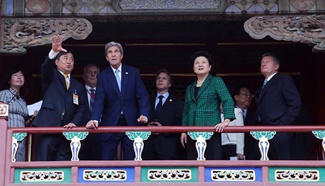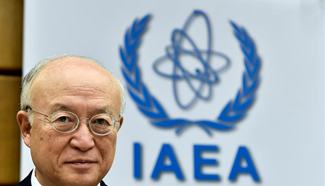|
|
An aerial photo taken on Sept. 25, 2015 from a seaplane of Hainan Maritime Safety Administration shows cruise vessel Haixun 1103 heading to the Yacheng 13-1 drilling rig during a patrol insouth China Sea. (Xinhua/Zhao Yingquan)
BEIJING, June 6 (Xinhua) -- There is a Chinese saying that goes like "the villain brings suit against his victim before he himself is prosecuted."
This is true in the Beijing-Manila South China Sea dispute.
The Philippines, which began illegally occupying some of China's islands and reefs in the 1970s, unilaterally filed the case with the arbitral tribunal in The Hague in 2013.
But the arbitration is but a political provocation under the cloak of the law, with some Western powers behind it. By filing the case, Manila violated the basic principles of international law and undermines the integrity and authority of the UN Convention on the Law of the Sea (UNCLOS).
In essence, the Philippines' requests are about territorial sovereignty and maritime delimitation.
But territorial issues are subject to general international law, not UNCLOS. Meanwhile, China also made a declaration on optional exceptions in 2006 in accordance with UNCLOS, which excluded disputes concerning maritime delimitation from dispute settlement procedures provided in the convention.
The arbitral tribunal has violated UNCLOS and abused its power by hearing the case and exercising jurisdiction where it has none.
The move by the tribunal has worsened tensions between China and the Philippines, affected regional stability and international maritime order, and contradicted its purpose of peaceful dispute settlement.
Moreover, by unilaterally initiating the arbitration, the Philippines not only abandoned the "Pacta sunt servanda" principle in international law, which means "agreements must be kept."
The two countries issued a statement in 2011 pledging to resolve disputes in the South China Sea through negotiations and consultations. The Philippines, however, unexpectedly brought the case to the Hague without informing China in advance. It even went as far as telling lies to the international community by saying bilateral means had been exhausted while in practice, it refused to handle the disputes as agreed with China.
According a spokesperson with China's Ministry of Foreign Affairs, Before unilaterally initiating arbitration, the Philippines did not hold any consultations or negotiations with China on relevant items.
The Philippines' actions showed no good will nor any intention to peacefully solve the South China Sea issue, but only an attempt to ramp up political pressure on China.
It intends to use the arbitration to deny China's territorial sovereignty and maritime rights and interests in the South China Sea, and seek support for its own invasion and illegal occupation.
Historically, the Philippine territories were defined by a series of treaties, including the 1898 Treaty of Paris and the 1900 Treaty of Washington between the United States and Spain, and a 1930 convention between the U.S. and Britain.
All the treaties clearly indicate that the west boundary of the Philippine territory was 118 degrees east longitude.
However, the Philippines violated these treaties and pursued territorial expansion by invading and occupying eight islands and reefs of China's Nansha Islands since the 1970s.
The arbitration is a political farce and a provocation under the pretext of the law. China will not accept nor recognize the "award," whatever it might be.
China's position to neither participate in nor accept the results of the arbitration does not mean the country disobeys international law. On the contrary, it demonstrates its commitment to it.
Related:
BEIJING, June 2 (Xinhua) -- The Chinese Society of the Law of the Sea has issued a statement on the South China Sea arbitration initiated by the Philippines. Following is the English version of the statement:Full story
Spotlight: China will not fall into trap of South China Sea arbitration: Chinese ambassador
JOHANNESBURG, June 2 (Xinhua) -- China will not give certain countries the satisfaction of tricking it into the trap of the South China Sea arbitration, Chinese Ambassador to South Africa, Tian Xuejun, said on Thursday.
In an article carried by Independent Media's nationwide newspaper The Star, Tian reveals the fallacy of the arbitration and reiterates the legitimacy of China's decision of neither participating in nor accepting the arbitration.Full story
Old map shows the Philippines' claim over South China Sea islands groundless
NEW YORK, May 29 (Xinhua) -- An old map published in 1899 by geographer J. Martin Miller shows that islands in the South China Sea have never been Philippine territory, Zeng Yingjing, the owner of the map, has told Xinhua.
The map was included in a book titled "The Twentieth Century ATLAS and Illustrated World," which was purchased by Zeng, a Chinese-American, at a flea market in New York in 2015.Full story












